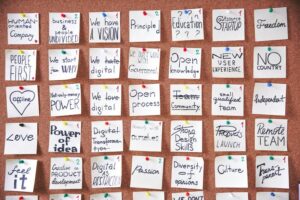The Mint Magazine covers a wide range of topics that relate to the Social Psychology of Economic Life. Our articles are short and designed to be an easy read. Below we have some suggestions for material that might help you bring different angles to your course weekly topics. You can also search for further content and explore the wealth of fresh thinking in economics that The Mint brings or check out our topics page.
To access, you need to register here with your LSE email.
Week 1 - Introduction
The birth of neoclassical economics and why and how social and psychological dimensions were excluded from its analysis of economic life.

More than a buzzword?
Anders Hayden charts the rise of a concept of an economy focused on human needs and sustainability, and warns of its vulnerability to being co-opted by the mainstream as a

Bread line not the cashline
Food for thought on Gaza’s runaway inflation from Frances Coppola. Inflation, we are told, is “always and everywhere a monetary phenomenon”: too much money chasing too few goods. Allowing the

The requirements of surplus
Michael Williams explains how inequality is preserved when there is enough for everyone. Modern economics purports to tackle the problem of scarce resources. In truth, our greatest challenge lies in
Week 2 - The social psychology of modernity: Tackling the disenchantment of the economic world
The social and psychological processes at the core of the experience economy used by corporations to combat the “disenchantment of the world” due to the development of market.

The growing realisation
Tim Jackson has just published a new book, Post Growth – Life After Capitalism, examining our disastrous obsession with growth in a finite world and how we might escape it.

All is revealed
Alessandra Mezzadri explains how productivity barely covers anything in fast-fashion prices. In April this year, the UK multi-channel retail brand Missguided advertised the sale of a £1 bikini. It was
Week 3 & 4 - Metaphors and decision-making in economic life & Narratives and decision-making

Home Truths
Government spending that is not investment is like continual partying and drinking. Tanweer Ali tells how austerity was sold as common sense. In the early days of David Cameron’s coalition

When the losers become the leaders
David Fell recalls his youth and… hopes. It is 1978 and your correspondent is 13 years old. I have not yet heard of economics – I am, perhaps, a nascent
Week 5 & 6 - The self & its extension in economic life and Presenting the sefl to others in economic life

Beyond denial
Sandra White maps a route through denial and towards action on climate change. Despite growing evidence of climate change, only a few years ago I regularly heard people deny that

10 Years after: Testimony from the Crash
The following is based on the actual testimony of real people who were affected by the Crash in different ways. It was performed as an improvised piece by Annee Blott
Week 7 - Bonding with others in economic life

From Russia with luck
A tale of corruption and corridors. The Mint hears how Alena Ledeneva looks for favours. During the final days of the Soviet Union in 1990, a young sociology student in

Normally corrupt
Riccardo D’Emidio explores why social norms and informality matter in considerations of corruption. Growing up in a British-Italian household I was regularly surprised by how differently people behaved in the
Week 8 - Using and disrupting social norms

Nudge theory: the elbow or helping hand?
There is a backlash against Nudge Theory. In the original “nudge manifesto”, Nudge: Improving Decisions About Health, Wealth and Happiness, Richard Thaler and Cass Sunstein promoted the political value of

Impoverished economics? Unpacking the economics Nobel Prize
When the world is facing large systemic crises, Ingrid Kvangraven asks why is the economics profession celebrating small technical fixes? This week it was announced that Abhijit Banerjee, Esther Duflo

Revealing the fudge in ‘Nudge Economics’
Professor Sugden, a renowned and celebrated pioneer of behavioural economics, has written an important book. In it he skewers the “nudge economics” fudge that maintains the illusion of the possibility
Week 9 - Changing economic life: From scepticism to resistance in marketplace

If nothing changes it all stays the same
Changing minds changes very little. Overhauling the way we live is more like it. David Fell suggests that, for most of us, like-minded people will lead the way to Net

Bring out the Best
Governments using regulators and other institutions to stick-and-carrot people into acting for the common good is not the way to deliver policy. Henry Leveson-Gower shares his discovery of a more
Week 10 - Social exclusion in economic life

Hearty laughter
Dr Julian Abel tracks the emotional way to good health. England is about to undergo another reorganisation of health and social care by integrating the two. Theoretically, this should make
Behavioural insights in the age of austerity: how research on the psychology of poverty can help us to stay focused on society
Public policy attention toward behavioural insights risks focusing on individual decision-making at the cost of considering the root causes of broader societal problems. But evidence from emerging research that spans
